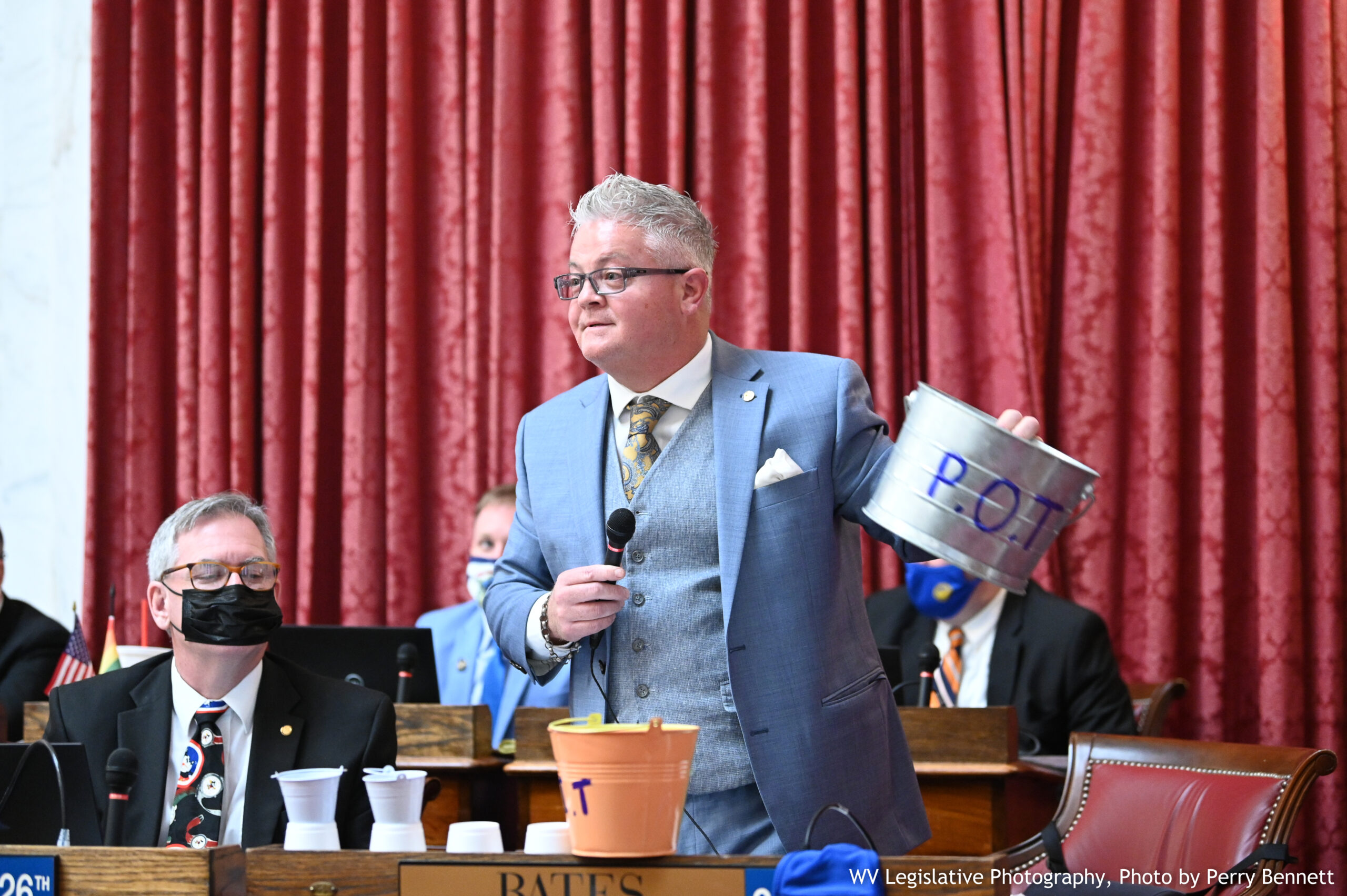MORGANTOWN – The House of Delegates passed its version of the personal income tax reduction and elimination plan Monday and sent it to the Senate. The House also adopted an amendment for a scaled-down, cheaper version of the Senate intermediate appeals court bill and will vote on it today.
Crossover Day is Wednesday and the bills containing the governor’s very different plan haven’t moved so this is the only framework still alive as the end of the session – April 10 – draws near.
As Delegate Mick Bates, D-Raleigh, pointed out during discussion of one of his two failed amendments, the Senate will either let the bill sit idle or load it up with offsetting tax hikes to resemble the governor’s bill and send it back to the House where it would die.
HB 3300 would start Jan. 1, 2022. Each income tax bracket would see a tax-rate reduction. At the same time, the state tax commissioner would look at tax year 2021 collections and use that figure to reduce tax year 2023 collections by $150 million and calculate tax year 2023 rates accordingly.
That process will continue in subsequent years – calculating new rates for the coming year based on prior-year revenue – until the income tax is phased out.
But the plan also includes an accelerator: The Income Tax Reduction Fund (ITR Fund), which would start receiving money July 1, 2022. Additional revenue from a variety of existing taxes would be channeled into the fund, which is intended as a safeguard against economic downturns.
When the ITR Fund reaches $400 million, $100 million would be transferred from it into the General Fund. This also triggers a new calculation of the tax-rate reduction based on reducing income tax revenue by $250 million.
Finance chair Eric Householder, R-Berkely, offered an amendment approved by the body to eliminate the so-called marriage penalty – which imposes a higher tax on a married couple than on the same two people filing separately – and moved the IRF start date from Jan. 1 to July 1 to correspond to the start of Fiscal Year 2023.
One of Bates’ failed amendments would have devoted any future tax revenue from the sale of non-medical adult-use marijuana to the IRF. He called it his POT bucket. “This is your chance to support raising new revenue and not raising taxes,” he said.
The other would have restructured the plan to more resemble a version that overwhelmingly passed the House last year but died in the Senate.
Gov. Jim Justice’s plan eliminates 60% of the personal income tax starting Jan. 1, 2022, and replaces most of the lost revenue with a variety of tax hikes: the sales tax; booze, smokes and soda; a luxury tax among them. His plan would reduce state tax revenue by about $1.035 billion and he proposes another $52 million in rebate for low-income households. The hikes would bring in about $902.6 million.
The House also rejected an amendment led by Delegate John Doyle, D-Jefferson, to limit the income tax cut to a one-year trial, with a $150 across-the-board cut for every taxpayer.
Doyle argued the amendment would let average wage earners keep more of their paychecks – $150 compared to $14 in the bill as is – and avoid any uncertainties regarding the American Rescue Plan’s ban on using federal COVID relief money to offset tax cuts. The amendment would be a trial run, essentially.
Bill opponents have argued that four years out, the House plan, with nothing but hoped-for growth to offset losses, could leave a budget hole of $600 million or more.
Minority leader Doug Skaff, D-Kanawha, pointed out there were only 12 days left in the session while the American Rescue Plan rules won’t be out for another 45 days.
Eliminating the income tax is a good idea, he said. “I want to do away with it, too. I question why now, why today.”
He suggested letting the bills die and forming a bipartisan work group to craft something over the summer.
Householder called the bill a “new green deal.” It offers tax relief for all without raising taxes or shifting the tax burden, and it controls spending growth.
HB 3300 passed 77-23 and heads to the Senate. Bates voted for it; two Republicans voted against it.
Intermediate court bill
The House formally adopted the Judiciary and Finance Committee amendments to SB 275, the Senate’s intermediate appeals court bill, which was on second reading.
The amendments reduce the size of the court from six judges to three and trim the startup cost from about $7.9 million to $3.6 million. Annual cost thereafter would fall from about $5.7 million to $2.1 million.
Skaff proposed another amendment that would delay launching the court until each of the state’s 31 judicial circuits have a family drug court, saying addressing the drug crisis is more important.
Delegate Lisa Zuloff, D-Marshall, supported the proposal, saying 303 of the Supreme Court’s 790 appeals were abuse and neglect cases.
Judiciary chair Moore Capito, R-Kanawha, argued Skaff’s proposal would guarantee the intermediate court would never happen. But the House version of the bill devotes all of the revenue from the $200 intermediate court filing fee to the Ryan Brown Addiction Prevention and Recovery Fund.
The amendment failed in a 28-72 vote. A Bates amendment also failed. The House then adopted the committee version in a divided voice vote. SB 275 is on third reading for passage today.
The House also adopted by voice vote SCR 14, which provides for the creation of a Suffragist Memorial Committee to develop a West Virginia Women’s Suffrage Memorial to be located on the Capitol grounds.
Tweet @dbeardtdp Email dbeard@dominionpost.com




